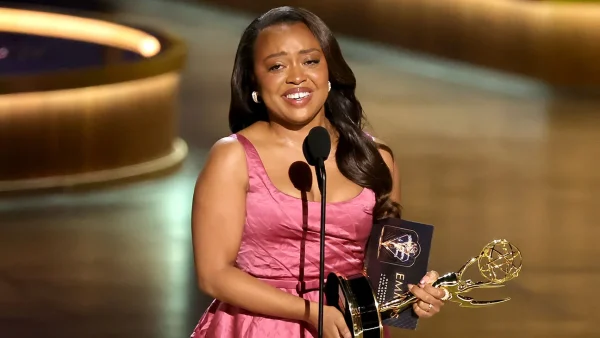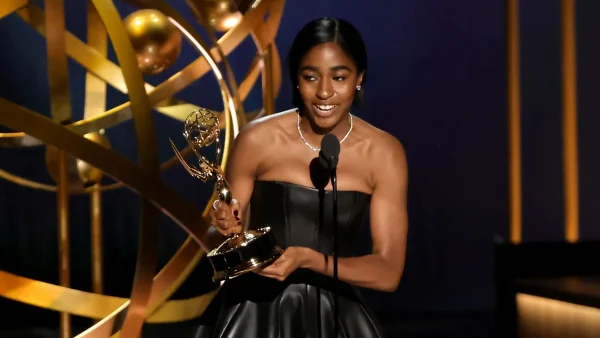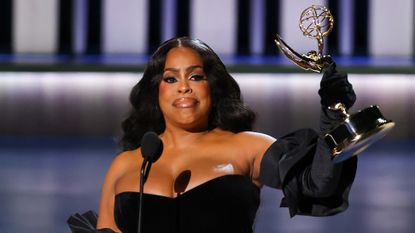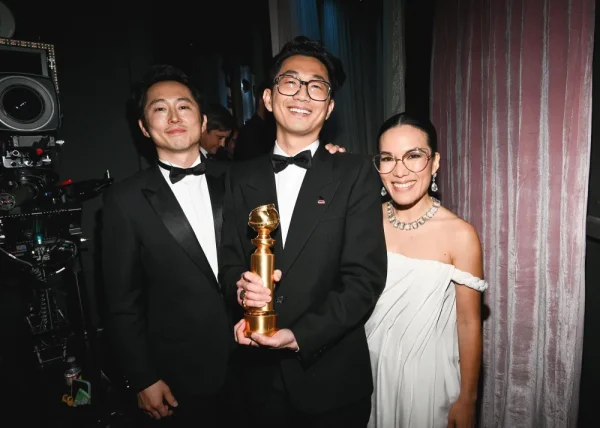The distinctive, iconic golden statuette of a winged woman balletically lifting an atom–representing the threshold of art and science–holds the highest honor for the film and television industry. The Emmys, an award ceremony anticipated by many every year, had finally arrived. Besides honoring numerous works of cinematography, we also celebrate the significant improvements in diversity of the Emmys from previous years. This year’s Emmys has been monumental for people of color and members of the LGBTQ+ community, as a record-breaking number of diverse talents were acclaimed.
 Quinta Brunson of Abbott Elementary took the stage for her performance as the lovable Janine Teagues, making history as the first black woman in over 40 years to win Lead Actress in a Comedy Series– following Isabel Sanford for The Jeffersons in 1981.
Quinta Brunson of Abbott Elementary took the stage for her performance as the lovable Janine Teagues, making history as the first black woman in over 40 years to win Lead Actress in a Comedy Series– following Isabel Sanford for The Jeffersons in 1981.

Ayo Edebiri was another recipient of the statuette for her performance in The Bear, winning the Supporting Actress in a Comedy honor as Chef Sydney Adamu. Edebiri is the third Black woman to take home the trophy, after Jackée Harry for 227 in 1987 and fellow nominee Sheryl Lee Ralph for Abbott Elementary in 2022. This win also holds significance as it was the most Black women ever nominated in the category.
Niecy Nash-Betts was awarded for best supporting actress in a limited series for her role as Glenda Cleveland in Dahmer — Monster: The Jeffrey Dahmer Story. In addition to expressing gratitude to all those who helped her win overall, Nash-Betts paid inspiring tribute to women of color in her speech:

“Finally, I accept this award on behalf of every Black and brown woman who has gone unheard, yet overpoliced, like Glenda Cleveland, like Sandra Bland, like Breonna Taylor! My job is to speak truth to power and I’m (going to) do it to the day I die.”
Nash-Betts’s heartfelt speech provided a voice for overlooked women of color and to push for equality through recognition. 
Creator of drama miniseries Beef, Lee Sung Jin, won three statuettes for writing, directing, and excellent limited series. He is the first Asian American to win in both the Writing for a Limited Series and Directing for a Limited Series categories, as well as the first to win all three in the same year. For their roles in the dark comedy, Steven Yeun and Ali Wong, the two leads of his series, also won lead acting Emmys: Yuen won Best Actor in a limited series, and Wong won Best Actress. The two were the first Asian winners in both categories.
Elton John became the first openly gay man as well as the 19th person in history to achieve EGOT status– receiving an Emmy, a Grammy, an Oscar, and a Tony award.
President Sarah Kate Ellis of GLAAD (Gay & Lesbian Alliance Against Defamation) received the TV Academy’s Governors Award on behalf of the organization, a transcendent moment for the LGBTQ+ community. During her speech, Ellis called for more transgender visibility, as well as emphasizing the importance of representation in the media:
Award institutions, like the Emmys, have a long history of overlooking people of color and diverse backgrounds; nevertheless, the industry is evolving, and this year’s winners reflect that. These diverse figures in the film industry have displayed their compelling talent to the world and will continue to inspire the future of cinematic arts.


